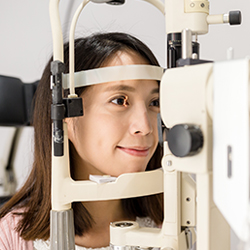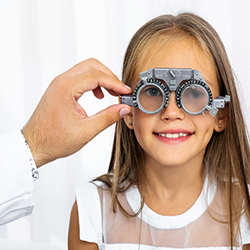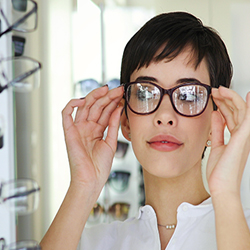
Your whole medical background is examined during a comprehensive eye exam. The care of your eyes should still be comprehensive even when you go to a different office for that purpose. The eye doctor will ask about your overall health, the overall health of your immediate family, any medications you’re taking, and any potential medical concerns like diabetes or high blood pressure. Additionally, they’ll ask if you smoke and how much sun exposure you get. Thanks to all these elements, the eye doctor can accurately evaluate your eye health.
Vision Screening vs. Comprehensive Eye Exam
While a vision screening may seem sufficient, it only provides a limited perspective on your eye health. It primarily focuses on visual acuity, but there’s more to consider, including color vision, peripheral vision, depth perception, and eye-focusing abilities. Additionally, vision screenings are often conducted by individuals lacking specialized eye health training, and they use inadequate testing equipment.
A vision screening may occasionally be as simple as looking at an eye chart across the room. They won’t have the sophisticated testing tools that an eye doctor would, even if they were done in a doctor’s office. Additionally, they won’t be aware of details like testing distances and room illumination that might alter test findings.
In contrast, our comprehensive eye exam covers all aspects of your vision and eye health. We begin with an external exam, carefully assessing the whites of your eyes, iris, pupil, eyelids, and eyelashes. Then, we move on to an internal exam, where we evaluate your retina and optic nerve after dilating your eyes. Our tests also include assessing visual function and eye health, such as color vision, depth perception, peripheral vision, and pupil response to light. We’ll also examine eye focusing, eye teaming, and eye movement abilities.
Furthermore, our comprehensive exam includes glaucoma testing, which checks the fluid pressure within your eyes to detect potential issues. We’ll also determine your visual acuity by testing your vision with different lenses, helping us identify if glasses or contact lenses can enhance your vision.
Don’t settle for partial information about your eye health. Choose our comprehensive eye exam for a thorough evaluation that covers all aspects of your vision and eye health. With our expertise and advanced technology, you can trust us to provide high-quality eye care. Schedule your comprehensive eye exam today and take a proactive step toward maintaining optimal eye health.
FAQs
 A thorough evaluation of your vision and the overall health of your eyes is performed during a comprehensive eye exam. It involves a series of tests and assessments performed by an eye care professional to assess your visual acuity, check for refractive errors, detect any eye diseases or conditions, and evaluate the overall health of your eyes.
A thorough evaluation of your vision and the overall health of your eyes is performed during a comprehensive eye exam. It involves a series of tests and assessments performed by an eye care professional to assess your visual acuity, check for refractive errors, detect any eye diseases or conditions, and evaluate the overall health of your eyes.
 A comprehensive eye exam is important because it helps detect potential eye problems early when they are most treatable. Many eye conditions and diseases, such as glaucoma and macular degeneration, initially show no symptoms in the early stages. A comprehensive eye exam can help identify these conditions before they cause significant vision loss or other complications.
A comprehensive eye exam is important because it helps detect potential eye problems early when they are most treatable. Many eye conditions and diseases, such as glaucoma and macular degeneration, initially show no symptoms in the early stages. A comprehensive eye exam can help identify these conditions before they cause significant vision loss or other complications.
 The frequency of comprehensive eye exams depends on various factors, including age, overall health, and any existing eye conditions. As a general guideline, it is recommended to have a comprehensive eye exam every 1-2 years for adults aged 18-60 with no known eye problems. However, individuals with specific risk factors or pre-existing eye conditions may require more frequent eye exams.
The frequency of comprehensive eye exams depends on various factors, including age, overall health, and any existing eye conditions. As a general guideline, it is recommended to have a comprehensive eye exam every 1-2 years for adults aged 18-60 with no known eye problems. However, individuals with specific risk factors or pre-existing eye conditions may require more frequent eye exams.

Your eye doctor will typically perform tests to assess your visual acuity, evaluate your eye movements, test your binocular vision, check your eye pressure, look at the external and internal structures of your eyes, and dilate your pupils for a more detailed examination of the retina.
